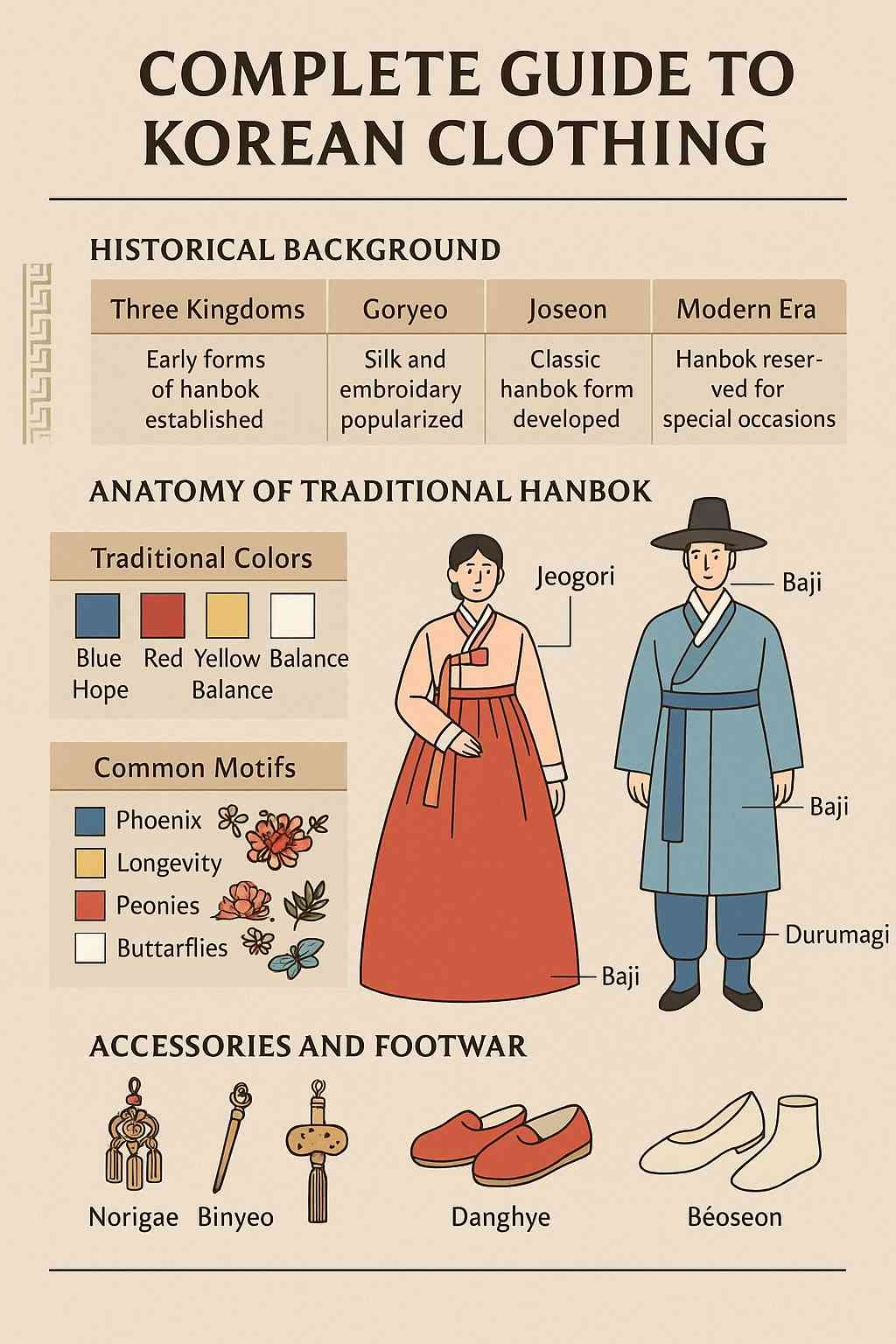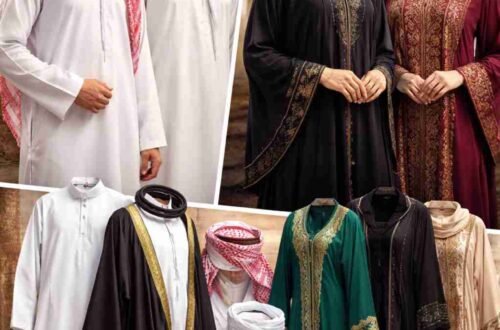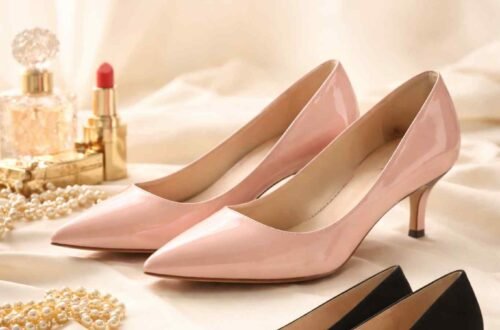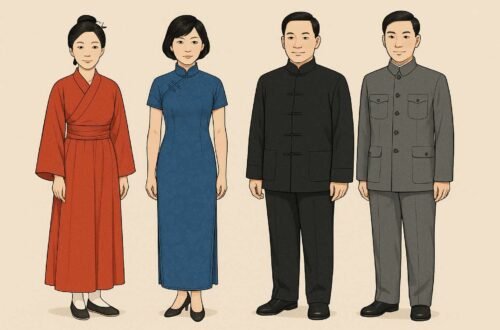Korean clothing shows the beauty of Korean culture and history. From the colorful hanbok to the trendy styles seen in modern Seoul, Korean clothes tell the story of how people in Korea live, think, and express themselves.
Short History of Korean Clothing
| Time Period | Clothing Style | Main Features |
|---|---|---|
| Three Kingdoms (57 BCE–668 CE) | Early form of hanbok | Simple jackets and skirts/pants |
| Goryeo Dynasty (918–1392) | Rich silk and embroidery | Influenced by China and Buddhism |
| Joseon Dynasty (1392–1897) | Classic hanbok shape | Colors showed social rank |
| Modern Times (1900s–today) | Western and Korean mix | Hanbok used for special days |
The word “hanbok” means “Korean clothing.” People wear hanbok on holidays, weddings, and celebrations.
Parts of a Traditional Hanbok
Women’s Hanbok
| Part | Description |
|---|---|
| Jeogori (저고리) | Short jacket with ribbons (goreum) |
| Chima (치마) | Long, wide skirt worn high on the waist |
| Sokchima | Underskirt for shape and comfort |
| Beoseon | White socks made of cotton |
Men’s Hanbok
| Part | Description |
|---|---|
| Jeogori (저고리) | Long upper jacket |
| Baji (바지) | Loose pants for easy movement |
| Durumagi (두루마기) | Long coat worn outside for warmth |
For Children and Ceremonies
-
Dolbok (돌복): Outfit for a baby’s first birthday
-
Hwarot (활옷) / Wonsam (원삼): Fancy dresses for weddings or royal use
Meaning of Colors and Patterns
Colors in hanbok are not random — they have deep meanings.
Five Traditional Colors (Obangsaek)
| Color | Meaning | Direction |
|---|---|---|
| Blue | Hope, growth | East |
| Red | Life, love | South |
| Yellow | Balance, center | Middle |
| White | Purity, truth | West |
| Black | Wisdom, depth | North |
Common Patterns
-
Cranes: Long life
-
Peonies: Wealth and beauty
-
Dragons & Phoenixes: Royal power
-
Butterflies: Happiness in marriage
Hanbok Accessories and Shoes
Accessories add beauty and show the wearer’s class or event type.
Accessories
-
Norigae (노리개): Pretty pendant hanging from the ribbon
-
Binyeo (비녀): Hairpin used to tie buns
-
Jokduri (족두리): Small hat for brides
-
Daenggi (댕기): Ribbon for braiding long hair
Read also: Complete Guide to Zimbabwe Clothing
Footwear
| Type | Description | For |
|---|---|---|
| Danghye | Silk embroidered shoes | Women |
| Gomusin | Rubber shoes for rain | Both |
| Beoseon | Soft white socks | All |
Hanbok Fabrics and Tailoring
Hanbok looks simple, but it is made with skill and care.
Common Fabrics
| Fabric | Use | Season |
|---|---|---|
| Silk | Smooth and rich | All year |
| Ramie | Light and cool | Summer |
| Hemp | Breathable | Summer |
| Cotton | Common and comfortable | Daily wear |
Sewing Style
-
Flat cutting for smooth lines
-
Few seams for flowy shape
-
Natural plant dyes for color
-
Hand-stitched edges for strength
How to Wear a Hanbok Properly
Hanbok is not just about clothes — it’s about manners.
Do’s
-
Tie the ribbon (goreum) neatly in a bow
-
Sit with your skirt spread evenly
-
Walk slowly to keep the outfit graceful
Don’ts
-
Do not hide hands in sleeves
-
Avoid dragging or stepping on the skirt
-
Don’t wear loud or clashing jewelry
Renting and Buying a Hanbok
Today, many people rent hanbok for photos or festivals.
Where to Rent
| Place | What You Can Do |
|---|---|
| Gyeongbokgung Palace (Seoul) | Rent hanbok and enter the palace for free |
| Bukchon Hanok Village | Take traditional photos in old streets |
| Jeonju Hanok Village | Try colorful hanbok styles |
Tips for Renting:
-
Prices: ₩10,000–₩40,000 (about $7–$30)
-
Choose bright colors for good photos
-
Wear light inner clothes for comfort
-
Return the outfit on time and clean
Buying Hanbok
-
Traditional tailors make custom silk hanbok for events
-
Modern designers (like Leesle and Danha Seoul) sell daily hanbok
-
Online stores offer global shipping and easy size options
Neo-Hanbok: Modern Korean Style
Neo-Hanbok means new-style hanbok. It keeps traditional shapes but adds comfort and modern design.
Main Features
-
Shorter skirts and jackets
-
Easier zippers instead of ribbons
-
Cotton or linen fabrics for daily wear
-
Simple and light colors like beige or pastel
Cultural Influence
-
K-pop idols and actors wear hanbok-inspired clothes in videos
-
Designers mix hanbok with modern street fashion
-
Brands like Leesle make hanbok for everyday life
Modern Korean Fashion Today
Korean fashion today mixes old and new ideas.
Popular Trends
-
Oversized jackets and wide pants
-
Layered outfits with soft colors
-
Gender-neutral designs
-
Eco-friendly, handmade fabrics
Famous Korean Brands
| Type | Brand |
|---|---|
| Street Style | thisisneverthat, ADER Error |
| Minimal Look | MUSINSA Standard, Andersson Bell |
| Neo-Hanbok | Leesle, Danha Seoul |
| Designer | Minju Kim, Lie Sang Bong |
K-fashion is now loved worldwide because it looks creative and confident.
North vs. South Korean Clothing
| Aspect | South Korea | North Korea |
|---|---|---|
| Daily Clothing | Western-style and modern | Simple and uniform-like |
| Hanbok Use | For holidays and photos | For national events |
| Style Variety | Many designers and shops | Limited fabric choices |
| Cultural Symbol | Fashion and heritage | Patriotism and formality |
Hanbok Word List
| Korean Term | Meaning |
|---|---|
| Jeogori | Jacket or top |
| Chima | Skirt |
| Baji | Pants |
| Durumagi | Coat |
| Norigae | Pendant ornament |
| Binyeo | Hairpin |
| Beoseon | Socks |
| Gat | Men’s hat |
| Wonsam / Hwarot | Royal or wedding robes |
| Neo-Hanbok | Modern hanbok version |
Final Thoughts
Korean clothing shows how tradition and creativity live together. The hanbok is not just old clothing — it’s art that moves and breathes with culture. Today, people wear hanbok with pride, mixing it with modern designs to create something new. Whether you wear it for fun, travel, or culture, Korean clothing reminds us that style can be simple, beautiful, and full of meaning.





